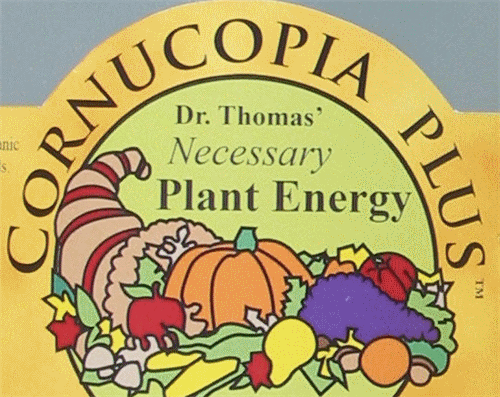| |
|
|
|
Back To Nutrients & Supplements :
Back To Dr. Thomas' Necessary Plant Energy
|
| |

|
(Click to view larger
image in a new window) |
|
|
|
|
| Item Description: |
We reserve the right to hold over all orders involving liquids placed in weather temperatures below zero degrees Fahrenheit. Please call for more information (800) 564-9376.
Instructions For Hydroponic Use Only:
Seedling & Young Plant Solution Recipe :
3/4 Teaspoon per. gallon Of Advantage Grow 2 Teaspoon per. gallon Of Plant Energy
Cloning Solution Recipe:
1-1/2 Teaspoon per. gallon Of Advantage Bloom 1 Tablespoon of Plant Energy
1 Teaspoon of Hormex Liquid
Sample Fertilizing Program:
Use Advantage Grow up to 2 weeks before you want to start blooms. Then switch to the Formula X for 2 weeks. After that switch to Advantage Bloom for 3 weeks or until good flower set. Then back to Formula X until harvest. Always using the Necessary Plant Energy.
Half & Half Mix For General Purpose Soil Or Hydroponics:
1-1/2 Teaspoons Advantage Grow Per. Gallon 1-1/2 Teaspoons Formula X Per. Gallon
3 Teaspoons Plant Energy Per. Gallon
Instructions For Soil Plants Only:
Advantage Grow 1 to 1-1/2 Teaspoon Per. Gal for light feeding plants once per week. 2-3 teaspoons per. Gal. for heavy feeding plants once per week or as needed. Use with Plant Energy at a rate of 1 Tablespoon per gallon at every feeding and every watering.
Advantage Bloom 1 to 1-1/2 Teaspoon Per. Gal for light feeding plants once per week. 2-3 teaspoons per. Gal. for heavy feeding plants once per week or as needed. Use with Plant Energy at a rate of 1 Tablespoon per gallon at every feeding and every watering.
Formula X 1 to 1-1/2 Teaspoon Per. Gal for light feeding plants once per week. 2-3 teaspoons per. Gal. for heavy feeding plants once per week or as needed. Use with Plant Energy at a rate of 1 Tablespoon per gallon at every feeding and every watering
Product Equivalent Table:
16 Ounces are equal to: 96- Teaspoons, 32-Tablespoons, 2-Cups 32 Ounces are equal to: 192- Teaspoons, 64- Tablespoons, 4-Cups 1 Gallon is equal to: 128 Ounces, 768- Teaspoons, 256- Tablespoons, 16-Cups 2.5 Gallons are equal to: 320 Ounces, 1920- Teaspoons, 640-Tablespoons, 40-Cups 5 Gallons are equal to: 640 Ounces, 3840- Teaspoons, 1280- Tablespoons, 80-Cups
The two most obvious requirements for cell maintenance and growth are a source of energy and a source of carbon skeletons for higher plants. Both the energy and carbon skeletons are supplied by the reactions of the Tricarboxylic Acid cycle. In any plant tissue, the amount of acid varies with phase of development and environmental conditions. The limits of variation are the types of acid accumulated are genetically controlled.
Respiration represents largely the metabolism of Tricarboxylic Organic Acids in a series of biochemical reactions: Accumulating mineral ions; Oxidation of food occurring in living cells; Synthesizing fats; Proteins, sugars, and other compounds; Maintenance of protoplasmic structure; cell division. Organic acids that serve as respiratory intermediates are derived from carbohydrates occupying a metabolic crossroads between fats, protein, and carbohydrates.
Plant roots secrete carbon dioxide gas, carbonic acids, and organic acid into the soil where carbon dioxide gas is absorbed by the surrounding plant acids. The combination of gas and acids are then transported to the aerial parts of the plants, which contributes materially to the total carbon dioxide assimilation of plants. The relationship between acid metabolism, carbon dioxide fixation, and ion uptake by roots runs parallel with total photosynthetic assimilation. Many plant tissues can metabolically fix carbon dioxide from the atmosphere in a non-photosynthetic process involving organic acids, while carbon dioxide fixation in leaves involve organic acids. Apply 1 tablespoon per gallon of water.
In summary, Dr. Thomas' Necessary Plant Energy overwhelmingly aids in:
- Mineral metabolism
- Nitrogen metabolism
- Energy to drive metabolic processes
- Fat metabolism
- Carbohydrate metabolism
- Amino acid metabolism
- Carbon dioxide fixation
- Overall plant growth
|
|
| Customers who have purchased this item have also purchased: |
|
|
|
|
Customer Ratings and Reviews:
Add Your Own Review
Be the first to rate this item!
|
|
|
|